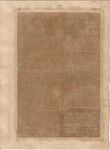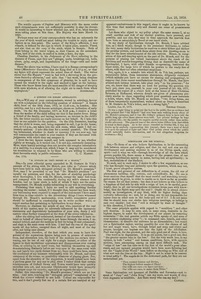< Spiritualism and Theosophy (continued from page 4-159) >
I see no such evidence, and can entertain no such faith. It may be that a fuller acquaintance with what I only know very imperfectly might alter my opinions. It may be that Buddhism is the nobler faith—that it is a noble one, I know—it may be that it suits others better than the faiths of the West. But it must be recommended on some more solid basis, and the philosophy that accompanies it must depend on some stronger arguments than any I have yet seen before I can accept it. Mr. Massey tells us that “authority is abhorrent to the Western mind.”
It depends very much on the hind of authority. I must assure my friends on both sides of me that they have misunderstood my position. I am not attacking anybody; I am not separating myself from any with whom it has been my privilege to act. I am not standing out on the side of any set of men against any other set of men. I am in a position of interrogation. I put my questions and pause for my reply. I assert my belief in much that Colonel Olcott propounds, and I am profoundly conscious of having derived from him, and especially from the honoured teacher whose views he expounds, much valuable light. But I am as far as I ever was from abandoning the banner which my hand has held for these seven years. I am occupied in holding it up now, and my eye can detect no rent in it from the attacks which it has sustained.
That some, that very many have no personal evidence of the return of the departed is unfortunately true. I am so far from denying that the evidence is not common that I lay stress upon the fact. If it were, I should not be writing this paper; for those who have achieved that platform of faith would not need any arguments of mine to defend it.
That immortality is conditional is, or may be, a misleading statement. What is meant by immortality? Miss Kislingbury’s thoughtful and able letter is pervaded by a fallacy. St. Paul and other writers, she tells me, propound the theory of conditional immortality. The Church recognizes it, and obviates the prospective annihilation by baptism. The theory permeates the language of piety, and is found in the parable of the sheep and the goats. I rubbed my eyes when I read this, and looked up my references. “These shall go away into everlasting punishment; but the righteous into life eternal.” Where is the conditional immortality there? Both sheep and goats are immortal; one in bliss, and the other in woe. The Bible gives no sanction whatever to the notion of potential immortality. It roundly asserts the indestructibility of the soul of man, and its endless life in heaven or hell. What Miss K. means is not immortality, but endless happiness; life eternal in opposition to eternal torment. No conditional immortality, as such, is predicated in the Christian system of any soul.
Mr. Massey makes much of my saying that some souls, by deliberate and conscious choice, sink into annihilation, and says that I am only separated by a thin division from the theory I reject. I fail to see the cogency of his argument. I do not know that any soul is ever annihilated. It may, as I hold, sink into depths of woe, be deprived of light, and live wholly in the filthy grovellings of a base material existence. In such cases the spirit is starved, and it sinks lower and lower until beyond spiritual ken. It may then be ruined, lost; as I also believe it may be saved. At any rate the cases, if there be such, are the exceptions which, by their rarity, only prove the rule.
This is a very different thing, surely, from that potential winning of something not inherently ours, that survival of the fittest, which Col. Olcott promulgates as a natural appendage to the Darwinian system— a rule, not an exception. It is another thing too from that notion of a separate overshadowing soul, which may be withdrawn from me even here. I believe that I have within me that which I cannot lose, save by a course of wilful sin deliberately persisted in to the bitter end, that which is mine to develops, cherish, to preserve; and this I value far more than that notion of a far off gloomy, brooding Presence, which is no part of me, though I may, perhaps, reach up to it; and which is so far from being the heritage immortal in each, that it is only gained by few.
This I hear of (as I should have said) for the first time as a part of the Theosophist platform, which is propounded to us by those “of the inner ring” “as a better guide to happiness than Christian Theology,” as a part, in fact, of “the Oriental religious philosophies.” I have read both Mr. Maitland and Mr. Massey’s review of him; and when I did so the idea jarred on me as strongly as it does now. I find no room for it in my system of religion, no countenance for it on the Western theology which I know, and no beauty that I should accept it in preference to what I hold as a “more excellent way” of belief.
This, be it observed, is the attitude of inquiry. If there are reasons why we Westerns should accept an Eastern philosophy or religion, why we Spiritualists should abandon one faith in favour of a new belief, let those reasons be set forth with exactitude.
It remains for me, leaving out much that I should like to say, to correct a misapprehension caused by my own words. I said that the return to us of the departed spirits of humanity was the centralfact in Spiritualism. I do not, on reflection, maintain that position. I have already pointed out how the truth slipped into the background, and while, to me, from my own experience, it is a great truth, an assured fact, I quite see and understand that many share Mr. Massey’s position, and have no personal evidence of the fact. I can readily see what a difference that would make in my mind.
Two lines will be sufficient for me to supply any omission which might be deemed uncourteous to my friends. If my words seem to be those of an antagonist, I beg them to believe that I write nothing in opposition; nothing in any interest save that of truth; and, I maintain, a mind free, not only from prejudice, but, I hope, from any feeling that could hinder me from receiving new truth. My position as yet is one that has undergone no change. A Spiritualist convinced of the truth of spiritual communion, I plead guilty to no if egotism of the emotions,” any more than I should to any such charge levelled against any display of my affections. I have affections, and I have emotions; and I am not ashamed of their legitimate exercise. I have known the impulses of affection to be true when the logic of the brain is at fault. I know the use, and I know the misuse of the emotional side of nature, and I am hardly likely to be accused of giving too loose a rein to enthusiasm.
Convinced, moreover, of the necessity of rigid investigation and careful scrutiny of all alleged facts, I am anxious to reduce to lines of scientific observation all that can be so treated. I earnestly desire to look into every phase of truth and to listen with attention to all who can teach me anything. I must be allowed to say that I do or do not agree with my teachers, and in so far I have a Western abhorrence of Authority, and no further. I have my own experience which I cannot give to others, my own faith which I will not yield, though I would gladly share it with my friends. I know what I believe, and why, and am prepared to defend myself. But of late I have felt as one might feel who saw a living and breathing body strapped to the operating table whilst various Theorists, each with the scalpel that he has made, is hacking and hewing its limbs and familiar lineaments in pieces, in the hope of finding evidence of his idea And meantime the spirit has well-nigh fled, and the surgeons stand in grievous risk of assisting at the autopsy of a corpse.
A Question for Horary Astrologists
Sir,—Will any of your correspondents, versed in astrology, favour me with a judgment on the following question of sickness? A female child, born on the 26th June, 1875, at 11.45 a.m., in London. Her nativity, cast by a well-known astrologer, shows no indication of early death. On the 8th December, 1877, at 8.16 p.m., I receive a letter from the mother of the child telling me that it has scarlet fever. Being a friend of the family, and having, moreover, an interest in the child’s life, the letter renders me really anxious on her behalf. So I take this time as one suitable for the question. On the 12th December, hearing that the child is worse, and, being requested to call, I go to the house, and, at 5.5 p.m., am taken into the sick room, when again I feel extremely anxious. I take this time for a second question. The illness has terminated, whether in death or recovery I do not now say, but will communicate the result to your readers if they are favoured with judgments with which they can compare it.
I drew the two figures myself, and both appeared to me, whether rightly or wrongly, as it turned out, I do not say, extremely menacing. Here, since horary astrology does not involve the complex calculations of a nativity, is a simple test, which I hope it may not be considered too troublesome to respond to by those who are willing to advance their favourite study in public estimation.
Jan. 17th.
Editor's notes
- ↑ A Question for Horary Astrologists by Massey C.C., London Spiritualist, No. 283, January 25, 1878, pp. 38-40
Sources
-
London Spiritualist, No. 283, January 25, 1878, pp. 38-40


